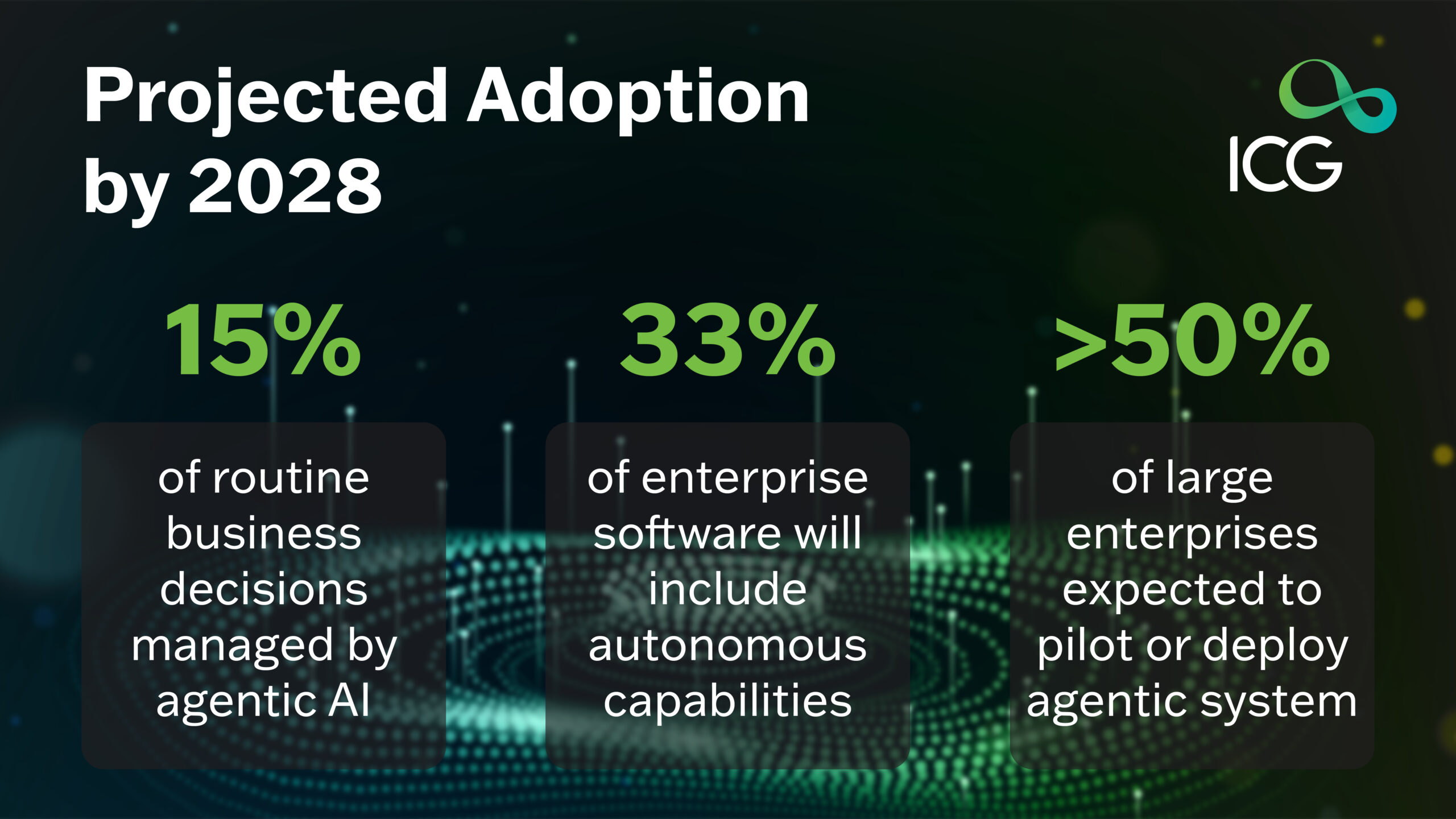Imagine working alongside someone who doesn’t wait for instructions, but anticipates what needs to be done, maps out a strategy, takes initiative, and adapts as challenges emerge. Now imagine that someone isn’t a person—but a form of artificial intelligence. This is Agentic AI: not just a helper, but a doer.
Intelligence in Action: Defining Agentic AI
While traditional AI systems answer questions or complete basic tasks, agentic AI identifies goals, breaks them down, and takes action—without explicit instruction. It combines independent decision-making, adaptability, and continuous learning, allowing it to manage sophisticated tasks. This goes beyond traditional automation—it’s a form of intelligence that takes initiative. Agentic AI marks a major shift in the human–machine dynamic. No longer passive tools, these systems operate with purpose: gathering context, making decisions, and adjusting strategies as conditions evolve. This makes them not just faster, but more flexible—and in a rapidly-changing world, flexibility is power.
Agentic AI Adoption in Action
This evolution is no longer experimental. Agentic systems are already in motion across different sectors. In operations, they manage tasks that span departments, flag issues, and follow up—without human intervention. In infrastructure, they respond to changing conditions and reroute traffic flow before congestion builds. In research, these systems independently analyze data, evaluate theories, and recommend actions, allowing scientists to concentrate on more complex cognitive tasks.
Agentic AI stands out for its ability to operate with full-spectrum intelligence aimed at achieving specific goals. Rather than stopping at analysis or recommendations, it takes initiative and completes tasks. By turning insights into immediate, goal-driven action, these systems can shorten decision cycles, reduce delays, and keep processes moving without constant supervision. When faced with uncertainty, they adapt in real time, maintaining momentum where traditional systems might pause or escalate for input.
Future Outlook
The trajectory is clear—and steep. By 2028, 15% of routine business decisions are expected to be managed by agentic AI, and approximately 33% of enterprise software will incorporate autonomous capabilities. But the road ahead isn’t risk-free: by 2027, more than 40% of agentic AI efforts may stall due to unclear plans, poor rollout, or unmet promises.
This rapid evolution is not just about adoption—it’s also about impact. Early deployment reports suggest that agentic systems can reduce decision-making time by 30–50% and cut repetitive task loads by up to 40% in operational settings. These numbers reinforce the dual message: the potential is transformative, but the challenges are real.

Unlocking that potential is far from straightforward. Agentic AI holds enormous promise, but success depends on more than just technology. It requires strategic clarity, thoughtful execution, and a foundation of trust. With autonomy comes complexity—these systems must not only understand what to do, but also why, and how their actions align with human values. That means establishing clear objectives, embedding safeguards, and maintaining continuous oversight.
Ambition alone isn’t enough. Effective integration demands clean, well-structured data, agile infrastructure, and a culture prepared to collaborate with systems that learn, adapt, and even challenge existing assumptions. This isn’t plug-and-play. It’s a shift in mindset.
AI at Work: from Tools to Teammates
Agentic AI isn’t simply changing how we use technology—it’s changing the nature of work itself. These systems are beginning to operate not just within workflows but alongside people, supporting decision-making, proposing solutions, and even managing teams of traditional bots.
From concept to practice, agentic AI is making its mark across sectors. In healthcare, it monitors patient data in real time, identifies anomalies, and initiates timely interventions. In customer service, it manages requests end to end—adapting its responses, tone, and actions to the situation. In finance, these systems identify regulatory risks early and address anomalies on their own before they develop into bigger problems.
No longer confined to static functions, intelligent systems are stepping into the role of dynamic collaborators. The future won’t be shaped by machines that wait for instructions, but by systems that understand goals, anticipate needs, and act with purpose. Embracing this shift means rethinking how organizations structure responsibility and trust in intelligent systems. Those who succeed will approach agentic AI not as a shortcut, but as a capable partner—one that needs guidance, governance, and room to grow.
The ICG Approach
At ICG, we offer a customized approach that empowers your teams with the latest insights and technology expertise to navigate the demands of today’s digital age. As Saudi Arabia embarks on its digital transformation journey, ICG plays a pivotal role in shaping the Kingdom’s tech landscape by providing cutting-edge solutions, strategic consultancy, and fostering innovation. Our comprehensive guidance, from fundamental concepts to practical implementation, helps organizations mitigate risks, stay ahead of the competition, and unlock their full potential in the accelerating digital environment.
Ready to talk?
Request your free Consultation to learn more about ICG’s capabilities and enablement to embark on a transformative expedition toward the summit of success.








